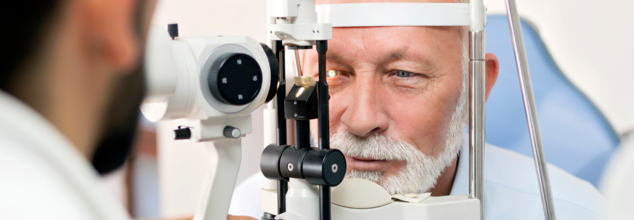- Health Conditions A-Z
- Health & Wellness
- Nutrition
- Fitness
- Health News
- Ayurveda
- Videos
- Medicine A-Z
- Parenting
Are People Too Busy To Take Care Of Their Own Health? Study Finds Lack Of Check-ups Increase Chances Of This Eye Condition

(Credit-Canva)
“Health is Wealth” is something we all teach our kids so that they learn to put themselves first, however many times they fail to learn it as we ourselves do not follow it.
While we are constantly urged to take care of our health above anything else, it is a message not many of us take seriously. Many people in the UK are putting their health on the back burner, claiming they're simply too busy.
A recent study reveals that one in five Brits are neglecting their own well-being, often skipping important appointments like eye exams, dental visits, and doctor's check-ups. In fact, three-quarters of people have either missed or postponed a health appointment because their schedules were too packed.
Why Are We So Busy?
The main culprits for these missed appointments seem to be work demands and childcare responsibilities. On top of that, the sheer stress of arranging the appointments themselves is another big reason adults avoid necessary blood tests or eye exams. This research, commissioned by Specsavers for Glaucoma Awareness Week, aims to shed light on glaucoma, often called the "silent thief of sight."
What is Glaucoma?
Glaucoma refers to a group of eye diseases that can lead to vision loss and even blindness. It does this by harming your optic nerve, which is like a cable at the back of your eye that sends images to your brain.
The tricky part about glaucoma is that its symptoms often begin so slowly you might not even notice them. This is why it's often called the "silent thief of sight." The only way to truly find out if you have it is by getting a thorough eye exam where your pupils are dilated.
While there's no cure for glaucoma, catching it early and starting treatment can often stop the damage and help protect your vision from getting worse.
Don't Wait for Symptoms
A spokesperson highlighted that it's easy to push check-ups aside when you feel fine and life is hectic. However, conditions like glaucoma can develop slowly without any noticeable symptoms. By the time you notice an issue, "irreversible damage" might have already occurred. That's why it's crucial not to wait for symptoms to appear; regular check-ups can help protect your long-term health.
Initially, glaucoma usually has no noticeable symptoms. This is a big reason why about half of the people who have it don't even know it.
Over time, you might slowly start to lose your vision. This often begins with your side (peripheral) vision, especially the part closest to your nose. Because this happens so gradually, many people don't realize their vision is changing at first. As the disease worsens without treatment, you may begin to notice significant blind spots and, eventually, it can lead to complete blindness.
Simple Tasks Often Overlooked
The study also found that busy adults often neglect other simple health tasks due to lack of time. These include getting a full night's sleep or drinking enough water. A significant number of people (one-fifth) admitted they've been so focused on work that they haven't taken proper screen breaks or even moved from their seats for long periods.
Among those who don't prioritize their own health, 28% put their children's needs first, while 19% prioritize housework. Sadly, over a third confessed that only a health scare or a clear symptom would finally push them to book a delayed check-up. Many understand the need for appointments but find them easy to forget.
Making Health a Priority
Many Brits believe that easier booking systems (four in ten) or simply more time in their day (a third) would help them focus more on their health. Specsavers emphasized that even though schedules are busy, ignoring eye care isn't an option. A quick eye check every couple of years can protect you from serious long-term problems. Your vision is incredibly valuable and deserves your attention.
As Winter Flu Spreads, Pharmacist Says Be Ready With These 4 Medicines

Credits: Canva
While December arrives with celebrations, food and social gatherings, it is also the time when seasonal illnesses quietly begin to surface. Colds, lingering coughs and flu tend to spread more easily in colder weather, often catching people off guard just as the new year begins. For those hoping to avoid starting January feeling unwell, there are simple steps that can be taken ahead of time.
A pharmacist has urged people to prepare early by stocking up on essential remedies, saying that being organised can help manage symptoms quickly and reduce unnecessary visits to the doctor. According to him, early action makes winter illnesses far easier to handle.
Why Pharmacists Say Preparation Matters Before January
Pharmacists say the key to getting through winter comfortably is preparation before cold and flu season reaches its peak. Keeping a well-stocked medicine cupboard means symptoms can be treated as soon as they appear, without the stress of searching for supplies while already feeling ill.
“Preparation really is half the battle,” said pharmacist Frederick Apenteng from Roseway Labs. “Once you’re unwell, the last thing you want is to be running around looking for paracetamol or trying to buy a thermometer. That’s often when people feel worse than they need to.”
Medicines To Get Ready For Winter Flu
Frederick stresses that starting with the basics is essential. Painkillers such as paracetamol or ibuprofen help manage fever, aches and general discomfort. Throat lozenges or sprays can ease soreness, while keeping two types of cough medicine at home is helpful. One should be an expectorant for chesty coughs, and the other a suppressant for dry, irritating coughs.
The Basics Every Household Should Have
Blocked noses are another common winter complaint, and decongestants can provide quick relief. However, Frederick warns they should not be used for more than five days. For longer-term congestion, saline nasal sprays are a safer option.
Other useful items include rehydration sachets, tissues, hand sanitiser, and honey and lemon for comfort. A digital thermometer allows you to keep track of fever, while vapour rubs or a humidifier can help ease breathing when congestion strikes.
Why Nutrition and Rest Matter for Immunity
Beyond medicines, Frederick highlights the role of nutrition in keeping the immune system strong. “People often feel run down because they’re missing key nutrients,” he explained. “Iron, B vitamins and vitamin C all play important roles in supporting immune defences.”
Eating foods rich in these nutrients, such as leafy greens, citrus fruits and whole grains, can make a noticeable difference. “The biggest immunity boosters are actually sleep, proper nutrition and staying hydrated,” he added.
A Little Planning Now Can Prevent Bigger Problems Later
Preparing in advance can ease both physical discomfort and mental stress. “Having your winter kit ready means you can act quickly at the first sneeze,” Frederick said. “That can stop symptoms from getting worse and helps keep you out of the GP waiting room.”
In short, early rest, basic treatment and preparation can help people move through winter with fewer disruptions.
Be Cautious With Cold and Flu Medicines
While home remedies can be helpful, it is important not to overuse certain products. In some cases, taking too many cold and flu medicines can cause serious problems, including accidental overdose, liver or kidney damage, and rebound congestion.
Always follow dosage instructions carefully and speak to a healthcare professional if you are unsure. Frederick also cautions against prolonged use of nasal decongestant sprays. Using them for more than a few days can trigger a rebound effect, where nasal passages become more blocked than before. This condition is known as rhinitis medicamentosa.
Staying informed, prepared and cautious can make all the difference during the winter months.
Adenovirus Incubation Period: How Long Does It Take For Symptoms To Appear?

Credits: Canva
If you managed to stay healthy this festive season, chances are you still know at least a couple of people who did not. In the days before Christmas and in the weeks that followed, a so-called “mystery virus” has been moving rapidly across the UK.
Many people have reported coughing, sneezing, blocked or runny noses, and in some cases stomach-related problems too. So what exactly is behind this wave of illness? Ian Budd, lead prescribing pharmacist at Chemist4U, has explained which virus is currently spreading widely across the country and what steps you can take to safeguard yourself and your family. He also sheds light on its incubation period.
What Is Adenovirus?
Adenoviruses refer to a large family of viruses that can trigger infections ranging from mild to more serious, affecting different parts of the body. Most often, adenovirus targets the respiratory tract. The symptoms can closely resemble those of a cold or flu. In the majority of cases, adenovirus infections are mild and can be managed with basic care focused on easing symptoms.
Adenovirus Incubation Period
The incubation period for adenovirus usually falls between 2 and 14 days. For many people, signs such as fever, a sore throat, or coughing tend to appear around five or six days after coming into contact with the virus, although this can differ from person to person. Adenovirus spreads easily through droplets released when someone coughs or sneezes, by touching contaminated surfaces, or through fecal-oral transmission. It is highly contagious, particularly in crowded settings, and people may continue to shed the virus even after they start feeling better, according to the National Institute of Health.
One reason the virus appears to be everywhere right now is winter behaviour. Colder weather keeps people indoors for longer periods, increasing close contact with others who may already be unwell.
Ian explained, “With COVID-19 restrictions no longer in place and fewer people being exposed to common viruses over the last few years, overall immunity in the community may be lower. That makes people more vulnerable now.
“Adenovirus itself is not new. It is simply appearing more frequently at the same time as other winter illnesses.”
Adenovirus Symptoms
If you suspect you may have adenovirus, the most common symptoms include:
- Sore throat
- Runny or blocked nose
- Cough
- Fever
- Fatigue
- Headaches or body aches
- Shortness of breath, which is less common
Other possible signs:
- Pink eye, also known as conjunctivitis, causing red, watery, gritty-feeling eyes
- Ear infections, particularly among children
- Digestive symptoms such as nausea, vomiting, or diarrhoea with certain strains
Who Do Adenoviruses Affect?
Adenoviruses can infect people at any age, but they are especially common in children under the age of five. In babies and young children, the virus often spreads in daycare settings, where close contact is unavoidable. Young children are also more likely to put shared objects in their mouths and are less consistent about handwashing.
Among adults, adenoviruses tend to spread in crowded living conditions. Those who spend time in dormitories or military housing may face a higher risk. The virus can also circulate easily in hospitals and nursing homes.
People with weakened immune systems are more likely to become seriously ill if they contract adenovirus. This group includes individuals who have undergone stem cell or organ transplants, as well as those living with cancer or HIV/AIDS. Those with existing heart or lung conditions also face a higher risk of severe infection.
After Weight-Loss Injections, Some Women Are Seeking Costly Vaginal Cosmetic Surgery

Credits: Canva
Women are spending thousands of pounds to address an intimate and largely unexpected side effect linked to rapid weight loss caused by so-called “fat jabs.” As these injections grow quickly in popularity, doctors say sudden and significant weight loss is leading some women to notice changes in their labia or vulva.
This has resulted in a rise in private cosmetic procedures commonly referred to as “labia puffing.” For those unversed, the vulva refers to the external female genital area, which includes the labia. The labia are the folds of skin that surround the vaginal opening.
Weight-Loss Injections Go Mainstream
Originally developed to manage Type 2 diabetes, weight-loss injections have entered the mainstream at remarkable speed. As per Mirror, in the UK alone, about 2.5 million people are now using these drugs, according to figures reported by The Telegraph in October. That means roughly one in every 20 adults. Most users access the injections privately, as they are rarely available through the NHS. The report also noted that sales of medications such as Mounjaro and Wegovy reached 2.5 million in July, marking a sevenfold increase compared to the previous year.
While headlines have largely focused on visible changes such as slimmer bodies and faces, including among celebrities like Sharon Osbourne and Serena Williams, medical professionals say other, less discussed effects are starting to emerge.
Changes Beyond Common Side Effects
Along with widely known side effects such as nausea, diarrhoea, constipation, abdominal pain, and vomiting, some women are now reporting noticeable changes in the appearance of their vulvas and labia.
Doctors explain that the issue is not weight loss itself, but the speed at which it happens. Rapid weight loss strips fat from many areas of the body, including the vulval region. For some women, this leads to a loss of volume in the labia, causing loose or sagging skin. This can result in irritation and discomfort during everyday activities such as sitting, cycling, or exercising.
Women Share Their Experiences
Many women have taken to online forums to describe what they are experiencing. As per Mirror, one Reddit user shared, “She [the gynaecologist] told me my vulva is saggy and I will continue to experience pain when biking or sitting unless I have surgery or fillers.”
Doctors say these outcomes are not surprising. Dr Michael Tahery, writing on his women’s health website, explained that “the rapid weight loss that occurs throughout the body may result in visible sagging of the labia or vagina because of overall fat and volume loss.”
He added that this sagging can be caused by loose labia, excess skin in the vaginal area, wrinkles, or a combination of these factors. “It’s also common for rapid weight loss to cause the labia to suddenly feel out of proportion compared to how it previously felt,” he noted.
Not Just a Cosmetic Concern
For many women, the impact goes beyond appearance. The loss of natural cushioning can increase friction and sensitivity, turning once-comfortable activities into painful experiences. As a result, more women are seeking help from private clinics, where corrective procedures can cost around $2,000, or approximately £1,479. The treatment, often called labia puffing, focuses on restoring volume to the outer lips of the vulva.
What Is Labia Puffing?
Speaking to The Daily Star, Dr Shazia Malik, consultant gynaecologist at The Portland Hospital, explained how the procedure works. “Labia puffing uses dermal fillers, such as hyaluronic acid or fat, to restore volume to the labia majora, which are the outer lips of the vulva,” she said. “It is a minimally invasive procedure designed to improve appearance by increasing fullness, smoothness, and symmetry.”
Dr Malik also pointed out that the demand is not limited to women using weight-loss injections. “The procedure is most commonly sought by women who want to regain a more youthful, fuller appearance due to ageing, weight loss, or childbirth,” she explained.
A Wider Impact of Rapid Weight Loss
The growing interest in these procedures highlights how dramatically weight-loss injections can change the body. Unlike gradual weight loss achieved through diet and exercise, the speed at which fat can disappear with these drugs means changes can occur in areas people do not expect. For some women, these sudden shifts are significant enough to push them toward cosmetic interventions to feel comfortable again.
© 2024 Bennett, Coleman & Company Limited

